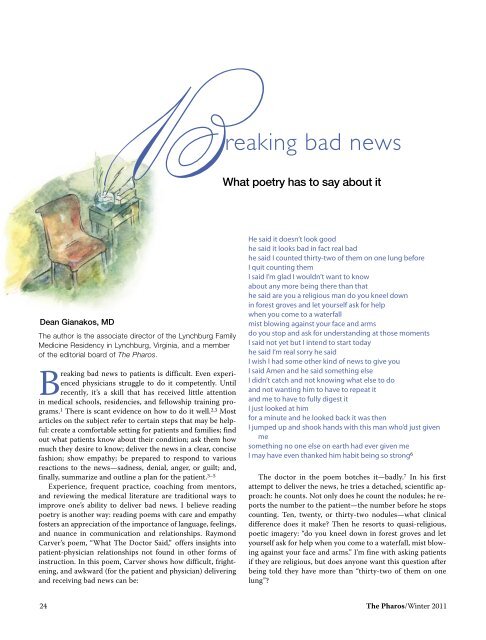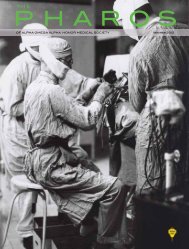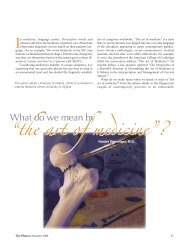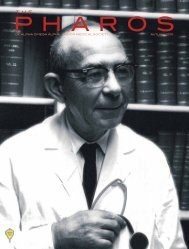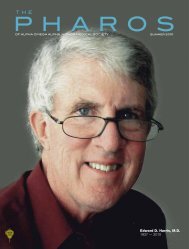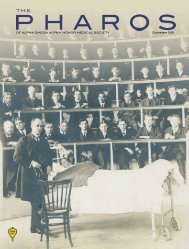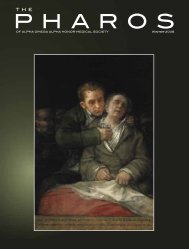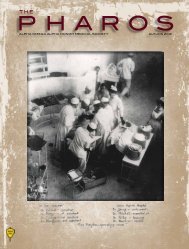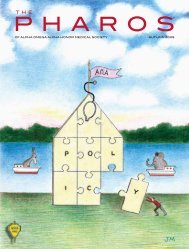Download The Pharos Winter 2011 Edition - Alpha Omega Alpha
Download The Pharos Winter 2011 Edition - Alpha Omega Alpha
Download The Pharos Winter 2011 Edition - Alpha Omega Alpha
You also want an ePaper? Increase the reach of your titles
YUMPU automatically turns print PDFs into web optimized ePapers that Google loves.
Dean Gianakos, MD<br />
B������������<br />
What poetry has to say about it<br />
<strong>The</strong> author is the associate director of the Lynchburg Family<br />
Medicine Residency in Lynchburg, Virginia, and a member<br />
of the editorial board of <strong>The</strong> <strong>Pharos</strong>.<br />
Breaking bad news to patients is difficult. Even experienced<br />
physicians struggle to do it competently. Until<br />
recently, it’s a skill that has received little attention<br />
in medical schools, residencies, and fellowship training programs.<br />
1 <strong>The</strong>re is scant evidence on how to do it well. 2,3 Most<br />
articles on the subject refer to certain steps that may be helpful:<br />
create a comfortable setting for patients and families; find<br />
out what patients know about their condition; ask them how<br />
much they desire to know; deliver the news in a clear, concise<br />
fashion; show empathy; be prepared to respond to various<br />
reactions to the news—sadness, denial, anger, or guilt; and,<br />
finally, summarize and outline a plan for the patient. 3–5<br />
Experience, frequent practice, coaching from mentors,<br />
and reviewing the medical literature are traditional ways to<br />
improve one’s ability to deliver bad news. I believe reading<br />
poetry is another way: reading poems with care and empathy<br />
fosters an appreciation of the importance of language, feelings,<br />
and nuance in communication and relationships. Raymond<br />
Carver’s poem, “What <strong>The</strong> Doctor Said,” offers insights into<br />
patient-physician relationships not found in other forms of<br />
instruction. In this poem, Carver shows how difficult, frightening,<br />
and awkward (for the patient and physician) delivering<br />
and receiving bad news can be:<br />
He said it doesn’t look good<br />
he said it looks bad in fact real bad<br />
he said I counted thirty-two of them on one lung before<br />
I quit counting them<br />
I said I’m glad I wouldn’t want to know<br />
about any more being there than that<br />
he said are you a religious man do you kneel down<br />
in forest groves and let yourself ask for help<br />
when you come to a waterfall<br />
mist blowing against your face and arms<br />
do you stop and ask for understanding at those moments<br />
I said not yet but I intend to start today<br />
he said I’m real sorry he said<br />
I wish I had some other kind of news to give you<br />
I said Amen and he said something else<br />
I didn’t catch and not knowing what else to do<br />
and not wanting him to have to repeat it<br />
and me to have to fully digest it<br />
I just looked at him<br />
for a minute and he looked back it was then<br />
I jumped up and shook hands with this man who’d just given<br />
me<br />
something no one else on earth had ever given me<br />
I may have even thanked him habit being so strong 6<br />
<strong>The</strong> doctor in the poem botches it—badly. 7 In his first<br />
attempt to deliver the news, he tries a detached, scientific approach:<br />
he counts. Not only does he count the nodules; he reports<br />
the number to the patient—the number before he stops<br />
counting. Ten, twenty, or thirty-two nodules—what clinical<br />
difference does it make? <strong>The</strong>n he resorts to quasi-religious,<br />
poetic imagery: “do you kneel down in forest groves and let<br />
yourself ask for help when you come to a waterfall, mist blowing<br />
against your face and arms.” I’m fine with asking patients<br />
if they are religious, but does anyone want this question after<br />
being told they have more than “thirty-two of them on one<br />
lung”?<br />
24 <strong>The</strong> <strong>Pharos</strong>/<strong>Winter</strong> <strong>2011</strong>


